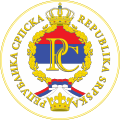History
On 25 November 1935, the Committee for the Establishment of the National Library decided to establish the National Library of King Peter I the Great Liberator. [1]
The House of King Peter I provided the premises for the library and the Ministry of Education designated a primary school teacher as the librarian. The Royal Ban administration of Vrbas municipality in Banja Luka authorized an annual subsidy. The association of Prosvjeta and Serbian Reading Room in Banja Luka donated many books, with other books donated by Gymnasium High School in Banja Luka and other private owners. [1]
The library had 6,000 books. The Prosvjeta Society also borrowed books from the Central Library in Sarajevo. [1]
The library opened on 26 April 1936 as the National Library of King Peter I the Great Liberator. It was the first public library in Banja Luka and the Vrbas Banovina province. [2] [1] [3] It operated on the premises of the House of King Peter the Great Liberator. [1]
The executive board was composed of members of the steering committee for raising the House of King Peter the Great Liberator, from the representatives of the Serbian Reading Room and secondary schools. Dr. Demetrius Zakic participated as the main representative of the Select Committee. [1]
On 30 July 1980 the National Library became the National and University Library "Petar Kocic". [3] In 1999, the Government of the Republika Srpska declared it to be the National and University Library of the Republic of Srpska "Petar Kocic". [3] In December 1999, the National and University Library of the Republic of Srpska "Petar Kocic" was renamed to the National and University Library of the Republic of Srpska. [1] [3]
A postage stamp was issued in Bosnia and Herzegovina in 2011 to commemorate the library's 75th anniversary. [3] [4]
This page is based on this
Wikipedia article Text is available under the
CC BY-SA 4.0 license; additional terms may apply.
Images, videos and audio are available under their respective licenses.


